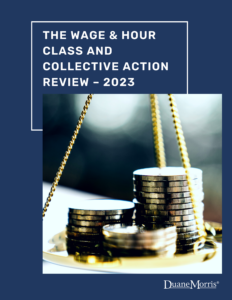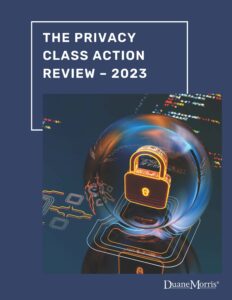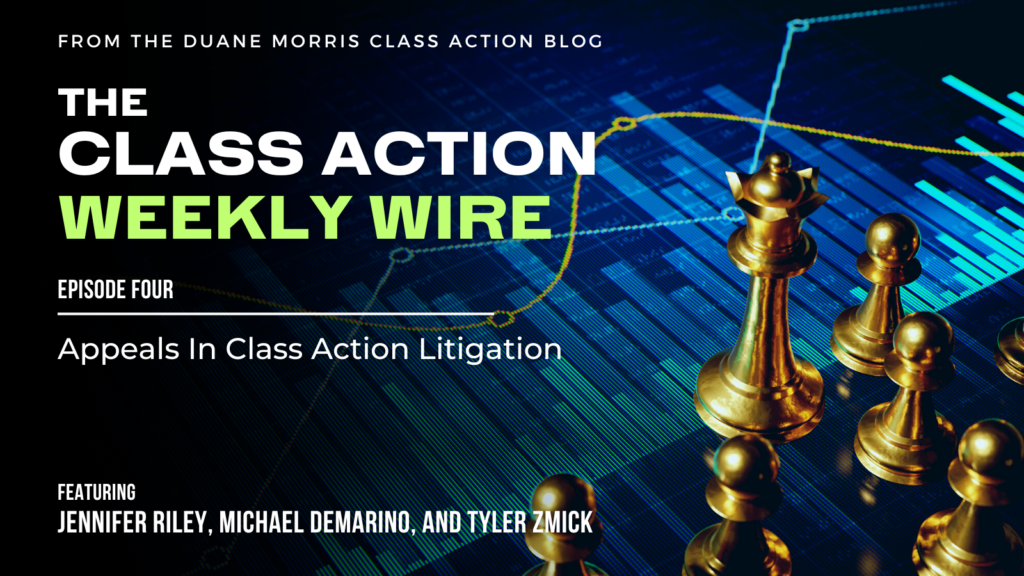Introducing The Duane Morris Wage & Hour Class And Collective Action Review – 2023
 By Gerald L. Maatman, Jr., Jennifer A. Riley, and Gregory Tsonis
By Gerald L. Maatman, Jr., Jennifer A. Riley, and Gregory Tsonis
Duane Morris Takeaways: Complex wage & hour litigation has long been a focus of the plaintiffs’ class action bar. The relatively low standard by which plaintiffs can achieve conditional certification under the Fair Labor Standards Act (FLSA), often paired with state law wage & hour class claims, offers a potent combination by which plaintiffs can pursue myriad employment claims. To that end, the class action team at Duane Morris is pleased to present the inaugural edition of the Wage & Hour Class And Collective Action Review – 2023. This new publication analyzes the key wage & hour-related rulings and developments in 2022 and the significant legal decisions and trends impacting wage & hour class and collective action litigation for 2023. We hope that companies and employers will benefit from this resource and assist them with their compliance with these evolving laws and standards.
Click here to download a copy of the Wage & Hour Class And Collective Action Review – 2023 eBook.
Stay tuned for more wage & hour class and collective action analysis coming soon on our weekly podcast, the Class Action Weekly Wire.
The Class Action Weekly Wire Podcast – Episode Four
Duane Morris Takeaway: This week on the Weekly Wire podcast, we are pleased to present Duane Morris partners Jennifer Riley and Michael DeMarino and associate Tyler Zmick in our fourth podcast in our series on class action litigation developments. This week’s edition focuses on appeals in class action litigation. We hope you enjoy it!
The EEOC’s 2022 Annual Performance Report Touts $513.7 Million In Worker Recoveries
 By Alex W. Karasik, Gerald L. Maatman, Jr. and Jennifer A. Riley
By Alex W. Karasik, Gerald L. Maatman, Jr. and Jennifer A. Riley
Duane Morris Takeaways: On March 13, 2023, the EEOC published its fiscal year 2022 Annual Performance Report (FY 2022 APR), highlighting the Commission’s recovery of $513.7 million in monetary relief for more than 38,000 victims of employment discrimination, including nearly $40 million as a direct result of litigation resolutions.
This annual publication from the EEOC is noteworthy for employers in terms of recognizing the EEOC’s reach, understanding financial exposure for workplace discrimination claims, and identifying areas where the EEOC may focus its litigation efforts in the coming year. It is a must read for corporate counsel, HR professional, and business leaders.
FY 2022 Statistical Highlights
The EEOC’s recovery of $513.7 million in monetary relief represents a solid increase from the $485 million in monetary relief that it secured in FY 2021. More noteworthy is that the Commission secured monetary relief on behalf of 38,000 alleged victims in FY 2022, which is more than double the amount from FY 2021, when monetary relief was recovered on behalf of 15,000 alleged victims. This suggests that more complainants are being made whole through the EEOC’s litigation and alternative dispute resolution efforts.
Approximately $342 million was recovered for more than 33,298 victims of employment discrimination in the private sector and state and local government workplaces through mediation, conciliation, and settlements. Furthermore, $39.7 million was recovered for 1,461 individuals as a direct result of litigation resolutions. Notably, the EEOC indicated it successfully resolved 44% of its conciliations, and among those successes, 43.1% involved one or more Strategic Enforcement Plan priority areas. The EEOC also conducted 6,578 successful mediations, resulting in $170.4 million in benefits for charging parties.
In terms of charge intake, the EEOC reported 73,485 new discrimination charges, an increase of nearly 20% compared to fiscal year 2021. This statistic suggest workers are increasingly more apt to turn to the Commission to resolve workplace discrimination disputes.
Finally, the EEOC filed 91 lawsuits in FY 2022 on behalf of 53 individuals, including 25 non-systemic suits with multiple victims, and 13 systemic suits involving multiple victims or discriminatory policies. Approximately half of the EEOC’s newly filed lawsuits raised one or more the EEOC’s Strategic Enforcement Plan priorities.
Strategic Priorities
Addressing systemic discrimination has long been a top priority for the EEOC. In FY 2022, the EEOC resolved over 300 systemic investigations on the merits, obtaining more than $29.7 million in monetary benefits. The EEOC also resolved 10 systemic lawsuits, obtaining over $28 million in relief for nearly 1,300 individuals and significant equitable relief. To ensure the systemic lawsuit cupboard was not left bare, the EEOC filed 13 new systemic lawsuits.
Advancing racial justice was another strategic priority for the EEOC in FY 2022. The FY 2022 APR notes that the EEOC resolved 18 lawsuits alleging race or national origin discrimination, for approximately $4.6 million in relief, benefiting 298 individuals. In addition, nine of the new 13 systemic lawsuits include claims of race or national origin discrimination. The EEOC also conducted 468 race and color outreach events, which reached 52,675 attendees. This includes 143 racial justice events reaching 9,064 attendees.
Finally, in recent years the EEOC has indicated that the use of artificial intelligence (“AI”) and algorithmic fairness in employment decisions is a strategic priority. In addition to providing AI training to systemic enforcement teams in the EEOC’s field offices, the EEOC hosted 24 AI and algorithmic fairness outreach events for 1,192 attendees. The EEOC’s efforts culminated with one lawsuit filing in this area. Finally, the EEOC prepared two ADA-related guidance publications relative to the use of artificial intelligence.
Other Notable Developments
Beyond touting its monetary successes, the FY 2022 APR also highlights the EEOC’s efforts in the community. The EEOC conducted 3,302 outreach and training events, providing more than 225,906 individuals nationwide with information about employment discrimination and their rights and responsibilities in the workplace. Among these outreach programs were 399 events for small businesses, which were attend by approximately 18,878 individuals. Finally, 369 outreach events concerned the intersection of COVID-19 and employment discrimination laws. These COVID-19 programs had 26,041 attendees.
The EEOC also expanded its digital footprint, as the EEOC’s website had 10.8 million users. This marks a 3% increase over fiscal year 2021. There were 16 million user sessions, a 4.4% increase over fiscal year 2021. The EEOC had over 29 million page views, a 4.4% increase over fiscal year 2021, and there was a 3% increase in mobile traffic on the website. This data suggests that potential charging parties and other various constituents are more actively engaging with the Commission through its online platforms.
Takeaways For Employers
While the 2020 global pandemic may have slowed down the workforce developments and relatedly the EEOC for a few years, the FY 2022 APR suggests the EEOC is back to investigating and litigating employment discrimination claims in full gear. Employers should be mindful of these data points in terms of implementing and enforcing policies against employment discrimination.
We anticipate that the EEOC will continue to aggressively pursue its strategic priority areas, such as systemic discrimination, racial justice, artificial intelligence, and its underlying goal of providing access to justice for underrepresented groups of workers. We will continue to track EEOC litigation developments throughout the year.
The Class Action Weekly Wire Podcast – Episode Three
The Class Action Weekly Wire Podcast – Episode Two
Introducing The Duane Morris Privacy Class Action Review – 2023
 By Gerald L. Maatman, Jr., Jennifer A. Riley, and Alex W. Karasik
By Gerald L. Maatman, Jr., Jennifer A. Riley, and Alex W. Karasik
Duane Morris Takeaways: The last year saw a virtual explosion in privacy class action litigation. As a result, compliance with privacy laws in the myriad of ways that companies interact with employees, customers, and third parties is a corporate imperative. To that end, the class action team at Duane Morris is pleased to present the inaugural edition of the Privacy Class Action Review – 2023. This new publication analyzes the key privacy-related rulings and developments in 2022 and the significant legal decisions and trends impacting privacy class action litigation for 2023. We hope that companies and employers will benefit from this resource in their compliance with these evolving laws and standards.
Click here to download a copy of the Privacy Class Action Review – 2023 eBook.
Co-Editor of the Review Jerry Maatman provided insights on our new publication earlier this week to the Wall Street Journal in its article on privacy class action litigation, which can be found here: Biometric-Privacy Rulings in Illinois Expand Potential Liability for Tech Firms – WSJ
Duane Morris partners Jerry Maatman, Jennifer Riley, and Alex Karasik also recently recorded the first edition of “The Class Action Weekly Wire,” our new podcast series, in which contributors to our Duane Morris Class Action Review discuss the significant rulings and legislation in various areas of law. To add context to our new publication, last Friday’s edition discussed recent developments in privacy class action litigation. Click here to watch and listen to the podcast!
DMCAR Trend #10 – DMCAR Trend # 10 – PAGA Actions Suffered Their First Setback, Work-Arounds Continued To Percolate Video
Introducing The Class Action Weekly Wire Podcast!
U.S. Supreme Court Decides FLSA Requires Overtime Pay For Highly Paid Day-Rate Workers
On February, 23, 2023, the U.S. Supreme Court decided Helix Energy Solutions Group, Inc. v. Hewitt No. 21-984 (U.S. Feb. 22, 2023), a highly anticipated ruling on the Fair Labor Standards Act (FLSA). The ruling is a cautionary tale for employers, warning that any cracks in their compensation structure may put them on the hook to pay overtime to high-earning employees. Hewitt determined that the FLSA required an employer to pay overtime to an offshore oil rig worker who earned over $200,000 annually because it paid him a daily, not weekly, rate. The decision is a must-read for all employers on their strategies for wage-and-hour compliance.
Read the full Alert on the Duane Morris LLP website.


